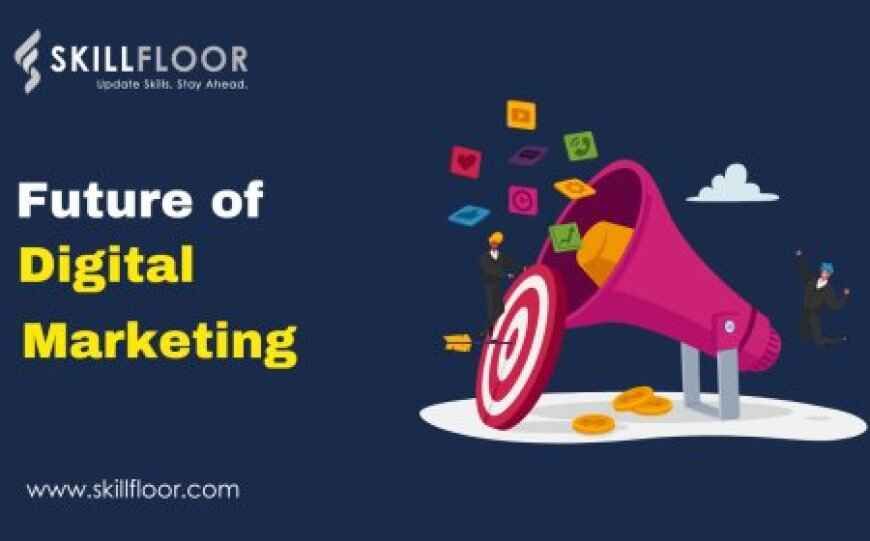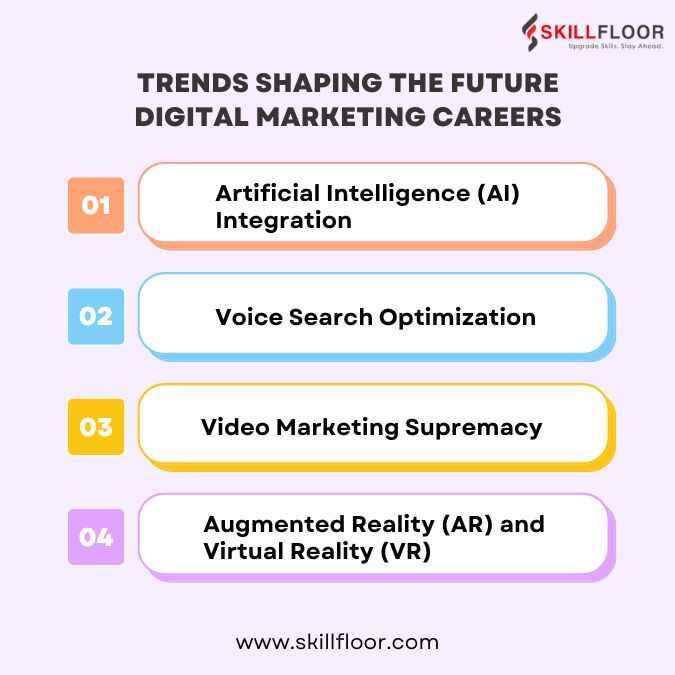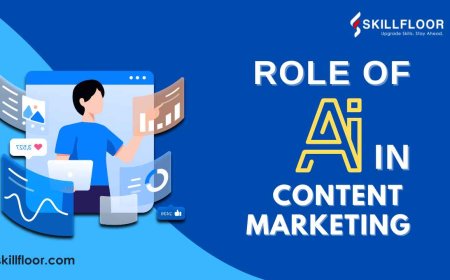The Future of Digital Marketing Careers
Discover what's next in digital marketing careers. Stay ahead with insights on trends, skills, and opportunities in this evolving field

In modern times, the scope and importance of digital marketing careers have grown dramatically. Digital marketing comprises a wide range of online techniques and tactics used to promote products, services, or brands via various digital media. From social media and email marketing to search engine optimization (SEO) and content development, digital marketers are influencing firms' online presence across industries.
Over time, there has been a notable evolution in digital marketing Careers. Simple websites and email campaigns were used at first. Digital marketing, however, has grown more intricate and multidimensional with the introduction of social media platforms, search engines, and advanced analytics tools. Technological developments have propelled this progression, enabling marketers to target consumers with never-before-seen accuracy and efficiency.
In today's fast-paced digital scenery, various factors are affecting the future of digital marketing jobs. Data-driven digital marketing careers, for example, use consumer insights and analytics to optimize marketing strategies and drive ROI. material marketing, on the other hand, focuses on providing useful and relevant material to attract and engage target audiences. Social media marketing is still a dominant force, with sites like Facebook, Instagram, and LinkedIn providing numerous options for business promotion. Furthermore, SEO and SEM continue to play important roles in increasing online visibility and delivering organic traffic to websites.
Emerging Trends Shaping the Future
1. Artificial Intelligence (AI) Integration
Artificial intelligence has transformed digital marketing. AI-powered technologies and algorithms analyze massive volumes of data to reveal customer behavior and preferences. Marketers may use AI to create highly tailored experiences for their target audience, resulting in greater engagement and transactions. Furthermore, AI allows predictive analytics, allowing marketers to anticipate consumer requirements and preferences and hence optimize their digital marketing campaigns in real time. Furthermore, automating mundane chores like email marketing, social media posting, and customer assistance streamlines operations, giving marketers more time to focus on strategy and creativity.
2. Voice Search Optimization
Voice search has grown in popularity as more voice-activated devices, such as smart speakers and virtual assistants, have emerged. Optimizing content for voice search is critical for businesses to be visible in search engine results. Unlike traditional text-based searches, voice queries are conversational and frequently contain long-tail keywords. Marketers must adjust their SEO tactics accordingly, optimizing for natural language queries and giving concise, relevant responses to users' requests. Voice search optimization gives brands the potential to increase their visibility and acquire a larger share of voice search traffic.
3. Video Marketing Supremacy
Video content has emerged as the most engaging and effective type of digital marketing. Platforms such as YouTube, TikTok, and Instagram have seen an increase in video consumption, making it critical for marketers to include video in their campaigns. Video content enables brands to express their message in a visually appealing and emotionally resonant manner, captivating their audience's attention. Furthermore, films are easily shareable across social media platforms, increasing their reach and company exposure. Marketers must use video to deliver engaging tales, highlight products or services, and interact with their audience on a deeper level.
4. Augmented Reality (AR) and Virtual Reality (VR)
Augmented and virtual reality technologies present great prospects for brands to build immersive and engaging experiences for their target audience. AR superimposes digital content on the actual world, improving the user experience in a variety of settings including product visualization, gaming, and marketing efforts. VR, on the other hand, takes customers to virtual worlds, allowing them to interact with businesses in completely new ways. From virtual try-on experiences to interactive product demos, AR and VR enable marketers to fascinate their audiences and generate deeper engagement. As these technologies grow more accessible and affordable, marketers should anticipate increased use in a variety of industries, altering how customers interact with companies.

Grabbing Opportunities in Digital Marketing
-
Continuous learning: Continuous learning is crucial for digital marketing professionals. You can accomplish this by completing online courses, attending workshops, or obtaining certifications. Learning keeps you up to date on industry trends and improves your abilities. Continuous learning allows you to remain competitive and adapt to changes in the digital environment.
-
Specialization: Digital marketing encompasses various sectors such as email, social media, and advertising. When you concentrate on one of these areas, you become extremely skilled at it. This makes you stand out to employers and leads to additional work prospects. Specializing, whether in social media ads or email campaigns, can help you develop a successful digital marketing career.
-
Networking: Networking is the process of connecting with professionals in the field. This can be accomplished by using social networking platforms such as LinkedIn, as well as attending events and joining groups. Networking allows you to learn from others, uncover career chances, and keep up with industry developments. You may advance your career in digital marketing by establishing a solid network.
-
Adaptability: Adaptability is key in digital marketing due to constant change. New technology and trends emerge on an ongoing basis. Being flexible involves being able to swiftly adjust to changes and gain new abilities. It is critical to remain adaptable and open-minded to keep up with the most recent advances in digital marketing. Staying competitive and succeeding in this fast-paced industry requires adaptability.
What are some future job roles in digital marketing to watch out for?
As digital marketing continues to evolve at a rapid pace, several new job roles are expected to emerge, reflecting advancements in technology and shifting industry trends. Here's a closer look at some of the future job roles in digital marketing to watch out for:
-
AI Marketing Specialist: As artificial intelligence (AI) becomes more integrated into marketing tactics, there will be a greater demand for AI marketing specialists. These professionals will use AI-powered tools and algorithms to analyze data, automate processes, and customize marketing strategies. AI marketing specialists will be critical in optimizing customer experiences, forecasting consumer behavior, and increasing ROI.
-
Virtual Reality (VR) Marketer: As virtual reality technology becomes more accessible and immersive, businesses are looking for new methods to engage consumers via VR experiences. VR marketers will be in charge of designing and promoting immersive brand experiences, interactive product demonstrations, and virtual events. These professionals will increase brand engagement, build emotional relationships with customers, and differentiate their offerings in the market by leveraging the potential of virtual reality.
-
Data Privacy Officer: Organizations are increasingly emphasizing compliance with rules such as the General Data Protection Regulation (GDPR) and the California Consumer Privacy Act (CCPA), as data privacy and security concerns rise. Data privacy officers will be responsible for ensuring that marketing efforts adhere to relevant laws and regulations, protecting consumer data, and maintaining customer confidence and openness. These individuals will be responsible for designing and executing data privacy policies, auditing, and dealing with data breaches or compliance issues.
The future of digital marketing employment is dynamic and bright, thanks to technical breakthroughs and shifting customer behaviors. As the digital world changes, professionals must adapt through ongoing education, specialization, and strong networking. Emerging professions such as AI Marketing Specialists, VR Marketers, and Data Privacy Officers underscore the importance of knowledge of cutting-edge technologies and ethical procedures. Embracing these changes will be critical for individuals hoping to succeed in this dynamic and ever-changing sector.



























































